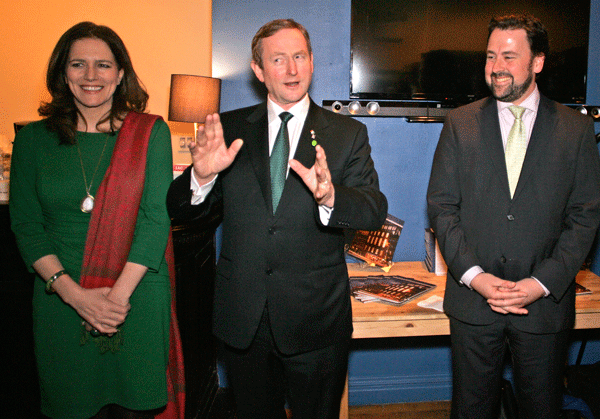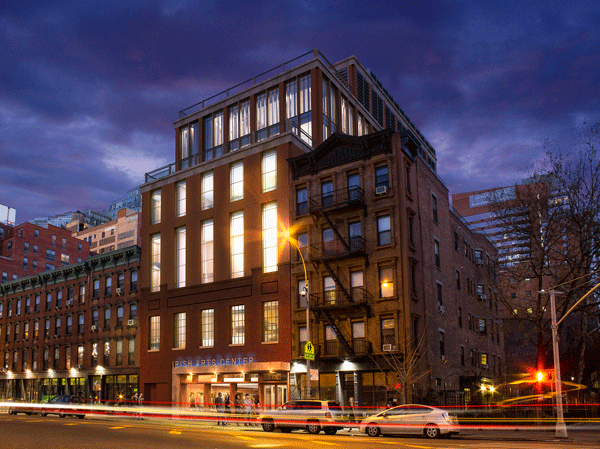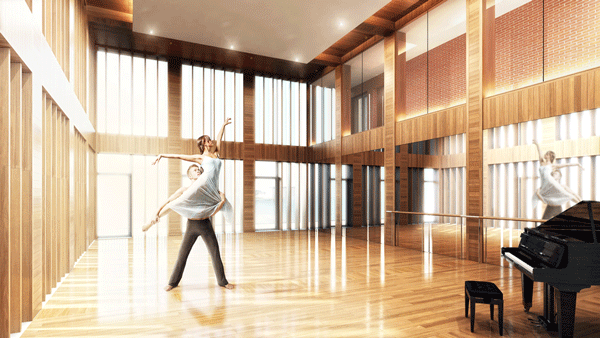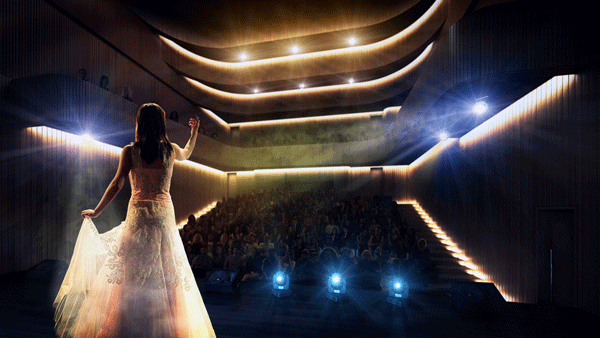
Irish Prime Minister Enda Kenny, center, spoke at the soon-to-be-expanded Irish Arts Center on March 17, flanked by IAC Executive Director Aidan Connolly, right and IAC Vice Chair Pauline Turley.
BY SAM SPOKONY | As he spoke to a beaming crowd in the cramped lobby of the Irish Arts Center (IAC) on St. Patrick’s Day, Enda Kenny (Ireland’s prime minister) recalled his favorite work by the legendary poet Seamus Heaney. It was “Lovers on Aran” ― a brief meditation on Ireland’s Aran Islands and the philosophical nature of their identity.
“He describes those ‘timeless waves, bright, sifting, broken glass,’ ” said Kenny, smiling and opening his arms wide. “And, as he said, they came ‘sifting from the Americas, to possess Aran.’ ”
Now, that storied interplay between Ireland and America ― spanning from New York’s early industrial days to the modern literature of Heaney and so many others ― is gaining yet another foothold. The IAC, located at 533 West 51 Street since its founding in 1972, has announced plans for a $54 million expansion that will increase its overall size by seven times ― from around 5,000 to 35,000 square feet ― and which will be funded through a unique partnership between New York City and the Irish government.

An exterior rendering of the Irish Arts Center’s planned new space on the corner of West 51st St. & 11th Ave.
For its new facility, the IAC plans to take over an adjacent city-owned building at the corner of 11th Avenue ― acquiring it from the city by the end of 2014 ― allowing the center to greatly expand its ability to present Irish and Irish-American theater, music, dance and art. Once complete, the center’s main entrance will then be located at 726 11th Avenue, with a side entrance at 555 West 51st Street.
“This will be a new center for a new century for a new Ireland,” said IAC Executive Director Aidan Connolly. “We will finally have a proper home to share the excellence, diversity and dynamism of Irish culture with New York and the world.”

A rendering of the center’s planned 1,250-square-foot dance studio.
Along with increasing the theater’s capacity from 99 to 199 seats, the new space will include an 80-to-90-seat cafe venue for live music, as well as a 1,250-square-foot studio for dance classes, artist residencies and rentals for catered events.

A rendering of the new 199-seat theater planned for in the center’s expansion.
The space will also include two classrooms for community education programs in Irish music, language and history, and a project space for visual arts. In addition, a new street-level “social space” will allow visitors and artists to gather before and after performances or classes, along with helping to engage with the greater Hell’s Kitchen community and surrounding neighborhoods.
In order to create those new elements, the center will construct five new stories atop the city-owned building, with groundbreaking planned for March 2015 and completion expected by the end of 2016, according to IAC leadership.
Before that groundbreaking can take place, the proposal will have to go through the city’s Uniform Land Use Review Procedure (ULURP) — which requires input from Community Board 4 (CB4) and the Manhattan Borough President, and, ultimately, approval from the City Planning Commission and the City Council. But the ULURP is unlikely to be controversial, since ― after some initial disagreements over plans for a taller building ― CB4 and local elected officials have expressed support for the proposal.
And as a show of that support, Councilmember Corey Johnson and Manhattan Borough President Gale Brewer were both in attendance alongside the Irish prime minister at the March 17 event.
Johnson, who is Irish-American, said that day that he is “thrilled” about the expansion, explaining that IAC worked closely with the community in order to respect the context of the neighborhood while increasing its size.
The structural plans were in fact created in partnership with Clinton Housing Development Company, a local affordable housing developer. That group’s executive director, Joe Restuccia, has said in a statement that he appreciated the IAC’s “deep understanding and commitment” to the community while proposing its expansion.
“[That communication] should be a model for all development in our city,” said Johnson.
The center has raised $37.5 million so far for construction costs. Out of that, $30 million has come from the city and $3.4 million has come from the Irish government, along with $3.5 million from IAC board members and $600,000 from New York state.
That leaves $16.5 million of fundraising to go ― but during his talk on Monday, Prime Minister Kenny seemed open to the possibility of pouring some more cash into the project.
“I’m aware of the financial situation,” said Kenny, “and we want to work and evolve with this in the best way that we can.”
Of course, the prime minister had come to the center that day after walking in the city’s St. Patrick’s Day parade just hours earlier. And, referencing the Heaney poem once again, he remarked upon his deep commitment to maintaining ties with allies across the pond.
“Here we are, in New York City ― which was built on and carries the personality of the Irish in so many ways ― to embrace America,” said Kenny. “That’s what we’ve got to do with the Irish Arts Center.
“Unity is strength, and the connectivity and collectivity of people brings results,” he continued. “For me, it’s about thinking of all the young dancers, the young dramatists, the young writers, the young people who over the next generation will come through these doors, and will hopefully go on to inspire so many others by what they do, by what they create, by what they say, and how they live.”




























